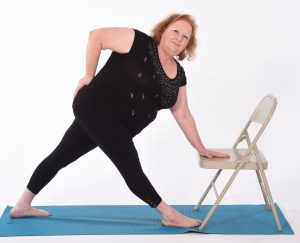Overweight and Obese Yoga Practitioners have a Higher Quality of Life
By John M. de Castro, Ph.D.
“Doing yoga decreases stress, improves flexibility, and increases muscle tone and strength. People with larger bodies often have trouble with joint pain; yoga can help by improving the body’s alignment to reduce strain on joints by allowing the frame to bear more of the body’s weight.” – Ann Pizer
Obesity has become an epidemic in the industrialized world. In the U.S. the incidence of obesity, defined as a Body Mass Index (BMI) of 30 or above has more than doubled over the last 35 years to currently around 35% of the population, while two thirds of the population are considered overweight or obese (BMI > 25). Obesity has been found to shorten life expectancy by eight years and extreme obesity by 14 years. This occurs because obesity is associated with cardiovascular problems such as coronary heart disease and hypertension, stroke, metabolic syndrome, diabetes, cancer, arthritis, and others.
Obviously, there is a need for effective treatments to obese individuals. But, despite copious research and a myriad of dietary and exercise programs, there still is no safe and effective treatment. Mindfulness is known to be associated with lower risk for obesity, alter eating behavior and improve health in obesity. This suggests that mindfulness training may be an effective treatment for overeating and obesity alone or in combination with other therapies. Yoga may be particularly beneficial for the obese as it is both a mindfulness practice and an exercise. Yoga practice has been shown to have a myriad of physical and psychological benefits. These include significant loss in weight and body mass index (BMI), resting metabolism, and body fat in obese women with Type 2 diabetes and improve health in the obese.
In today’s Research News article “Quality of Life in Yoga Experienced and Yoga Naïve Asian Indian Adults with Obesity.” (See summary below or view the full text of the study at: https://www.ncbi.nlm.nih.gov/pmc/articles/PMC6515061/), Telles and colleagues recruited overweight and obese (BMI>25) adults (aged 20-59 years) and assessed them for participation in yoga practice and their quality of life, including general self-esteem, enjoyment in physical activities, satisfactory social contacts, satisfaction concerning work, sexual pleasure, and focus on eating behavior.
They found that in comparison to non-participants in yoga practice, the yoga participants had significantly higher overall quality of life including higher levels of general self-esteem, enjoyment in physical activities, satisfactory social contacts, and satisfaction concerning work. Hence, participation in yoga practice was found to be associated with significantly higher quality of life in overweight and obese individuals.
These findings are correlational and causation cannot be determined. It is possible that yoga practice causes improved quality of life, or that people with high quality of life tend to engage in yoga practice, or that some other factor, e.g. affluence, large social network, results in higher levels of both. Nevertheless, it is clear that practicing yoga is associated with better, more enjoyable lives, that overweight and obese yoga practitioners have a higher quality of life.
“’I think yoga can be a wonderful form of movement that bigger-bodied people can adapt for themselves.’ For folks carrying more weight, low-impact exercises like yoga may be more comfortable than, say, running on the pavement.” – Laura McMullen
CMCS – Center for Mindfulness and Contemplative Studies
This and other Contemplative Studies posts are also available on Google+ https://plus.google.com/106784388191201299496/posts and on Twitter @MindfulResearch
Study Summary
Telles, S., Sharma, S. K., Singh, A., Kala, N., Upadhyay, V., Arya, J., & Balkrishna, A. (2019). Quality of Life in Yoga Experienced and Yoga Naïve Asian Indian Adults with Obesity. Journal of obesity, 2019, 9895074. doi:10.1155/2019/9895074
Abstract
Background
Obesity adversely affects quality of life which then acts as a barrier to weight loss and weight loss maintenance. Hence, those interventions which positively influence the quality of life along with weight reduction are considered useful for sustained weight loss in persons with obesity. An earlier study showed better quality of life in obese adults who had experience of yoga compared to yoga naïve obese adults. However, the main limitation of the study was the small sample size (n=20 in each group).
Objective
The present study aimed to determine whether with larger sample sizes the quality of life would differ in yoga experienced compared to yoga naïve adults with obesity.
Methods
There were 596 Asian Indian obese adults (age range 20 to 59 years; group mean age ± SD; 43.9 ± 9.9 years): of whom (i) 298 were yoga experienced (154 females; group mean age ± SD; 44.0 ± 9.8 years) with a minimum of 1 month of experience in yoga practice and (ii) 298 were yoga naïve (154 females; group mean age ± SD; 43.8 ± 10.0 years). All the participants were assessed for quality of life using the Moorehead–Ardelt quality of life questionnaire II. Data were drawn from a larger nationwide trial which assessed the effects of yoga compared to nutritional advice on obesity over a one-year follow-up period (CTRI/2018/05/014077).
Results
There were higher participant-reported outcomes for four out of six aspects of quality of life in the yoga experienced compared to the yoga naïve (p < 0.008, based on t values of the least squares linear regression analyses, Bonferroni adjusted, and adjusted for age, gender, and BMI as covariates). These were enjoyment in physical activities, ability to work, self-esteem, and social satisfaction.
Conclusion
Obese adults with yoga experience appear to have better quality of life in specific aspects, compared to yoga naïve persons with a comparable degree of obesity.
https://www.ncbi.nlm.nih.gov/pmc/articles/PMC6515061/
